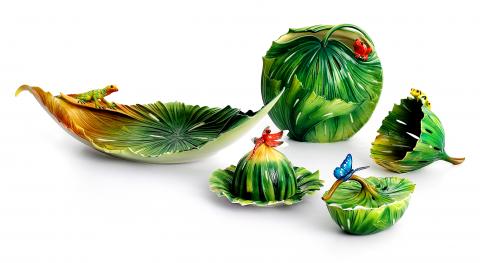Organizers say that more than 400,000 people have visited the Taipei World Design Expo at the Songshan Cultural and Creative Park (松山文創園區) since it opened on Sept. 30. Design fans will have a chance to see yet more items when additional exhibits open tomorrow at the Taipei World Trade Center Nangang Exhibition Hall (台北世界貿易中心南港展覽館) and the Taipei World Trade Center (台北世界貿易中心), where they will run until Oct. 30.
Exhibits at the Songshan Cultural and Creative Park focus on Taiwanese design, with subject matter ranging from artwork inspired by the calligraphy of Tong Yang-tze (董陽孜) to concepts for environmentally sustainable architecture. The events at the Taipei World Trade Center and Nangang Exhibition Hall will explore design across different industries created by international companies.
Organizers of the Taipei World Design Expo, including the Taipei City Government and the Taiwan Design Center (台灣創意設計中心), have invested more than NT$10 million to prepare the Nangang Exhibition Hall. Highlights brought in from overseas include a BMW M3 GT2 racecar customized by American artist Jeff Koons.

Photo courtesy of Taiwan Design Center
The Nangang Exhibition Hall will also feature industrial and product design by international corporations that blend Eastern and Western aesthetics to create items that are appealing to a worldwide audience. These companies range from Japan’s Toyota and Muji to Taiwanese fine porcelain maker Franz Collection (法藍瓷). Franz’s display will include the porcelain series Rainforest Little Dwellers, a recipient of the UNESCO Award of Excellence for Handicrafts that features delicately sculpted and painted renditions of rainforest creatures such as butterflies, dragonflies, frogs and lizards.
Part of the Taipei World Design Expo’s goal is to help establish Taiwan’s prowess for original design as manufacturing jobs are lost to China and Southeast Asia. One area at Nangang Exhibition Hall will shine a spotlight on products that are “MIT” (made in Taiwan) or “DIT” (designed in Taiwan), with more than 200 items by Taiwanese companies showcased, along with explanations of their design process. The IF Mode bicycle, for example, was created to attract commuters who might not have considered biking as a feasible alternative to driving or public transportation. The lightweight IF Mode, which has won Eurobike, iF Product Design and Golden Pin awards, features hidden dirt traps and folds up into a sleek, unobtrusive and easy-to-carry bundle.
The Taipei World Trade Center event, where five small studio apartments will be built to give visitors ideas about how they can use design to enhance their daily lives, showcases the work of more than 100 Taiwanese designers.

Behind a car repair business on a nondescript Thai street are the cherished pets of a rising TikTok animal influencer: two lions and a 200-kilogram lion-tiger hybrid called “Big George.” Lion ownership is legal in Thailand, and Tharnuwarht Plengkemratch is an enthusiastic advocate, posting updates on his feline companions to nearly three million followers. “They’re playful and affectionate, just like dogs or cats,” he said from inside their cage complex at his home in the northern city of Chiang Mai. Thailand’s captive lion population has exploded in recent years, with nearly 500 registered in zoos, breeding farms, petting cafes and homes. Experts warn the

No one saw it coming. Everyone — including the Chinese Nationalist Party (KMT) — expected at least some of the recall campaigns against 24 of its lawmakers and Hsinchu Mayor Ann Kao (高虹安) to succeed. Underground gamblers reportedly expected between five and eight lawmakers to lose their jobs. All of this analysis made sense, but contained a fatal flaw. The record of the recall campaigns, the collapse of the KMT-led recalls, and polling data all pointed to enthusiastic high turnout in support of the recall campaigns, and that those against the recalls were unenthusiastic and far less likely to vote. That

The unexpected collapse of the recall campaigns is being viewed through many lenses, most of them skewed and self-absorbed. The international media unsurprisingly focuses on what they perceive as the message that Taiwanese voters were sending in the failure of the mass recall, especially to China, the US and to friendly Western nations. This made some sense prior to early last month. One of the main arguments used by recall campaigners for recalling Chinese Nationalist Party (KMT) lawmakers was that they were too pro-China, and by extension not to be trusted with defending the nation. Also by extension, that argument could be

The centuries-old fiery Chinese spirit baijiu (白酒), long associated with business dinners, is being reshaped to appeal to younger generations as its makers adapt to changing times. Mostly distilled from sorghum, the clear but pungent liquor contains as much as 60 percent alcohol. It’s the usual choice for toasts of gan bei (乾杯), the Chinese expression for bottoms up, and raucous drinking games. “If you like to drink spirits and you’ve never had baijiu, it’s kind of like eating noodles but you’ve never had spaghetti,” said Jim Boyce, a Canadian writer and wine expert who founded World Baijiu Day a decade